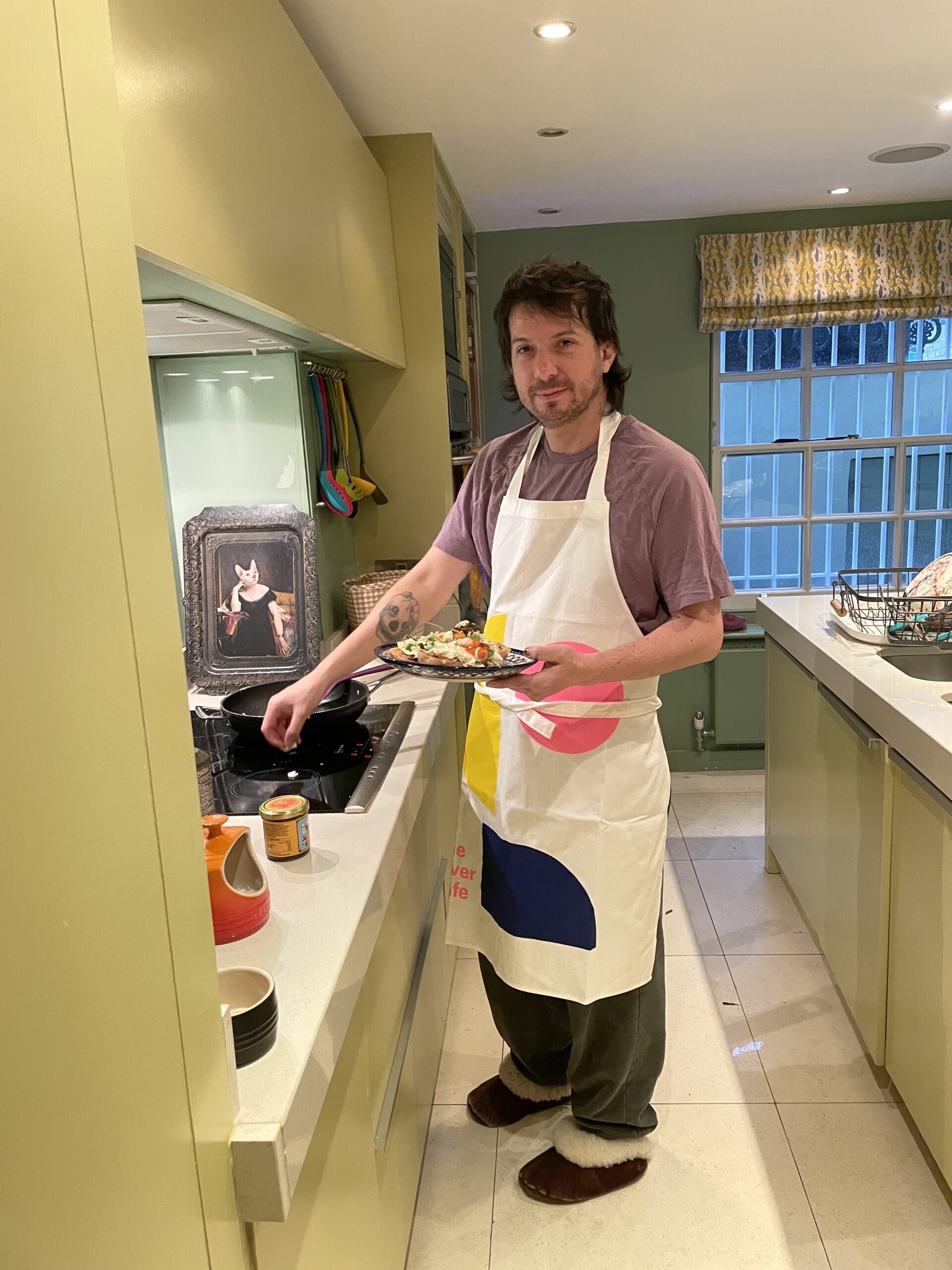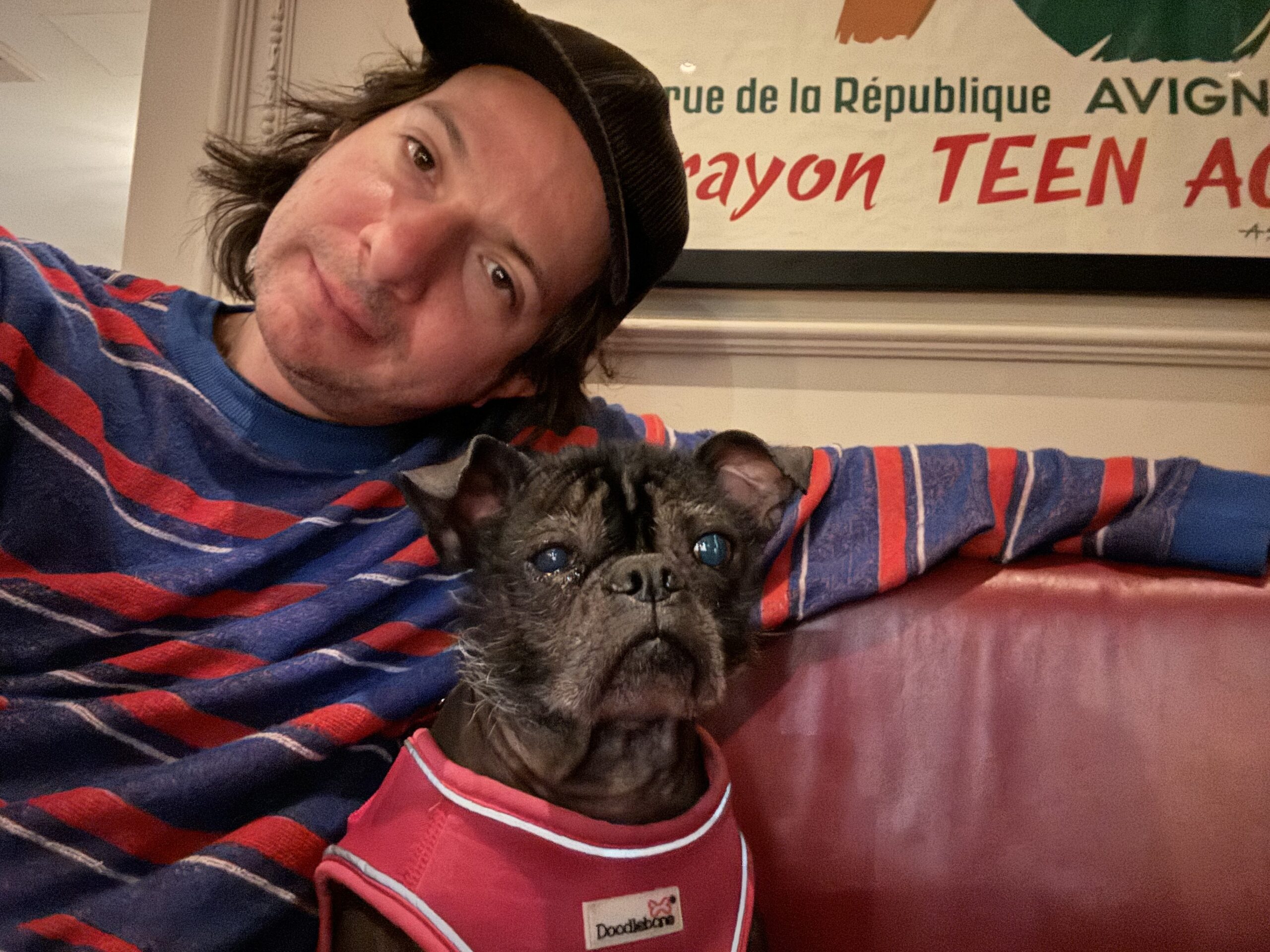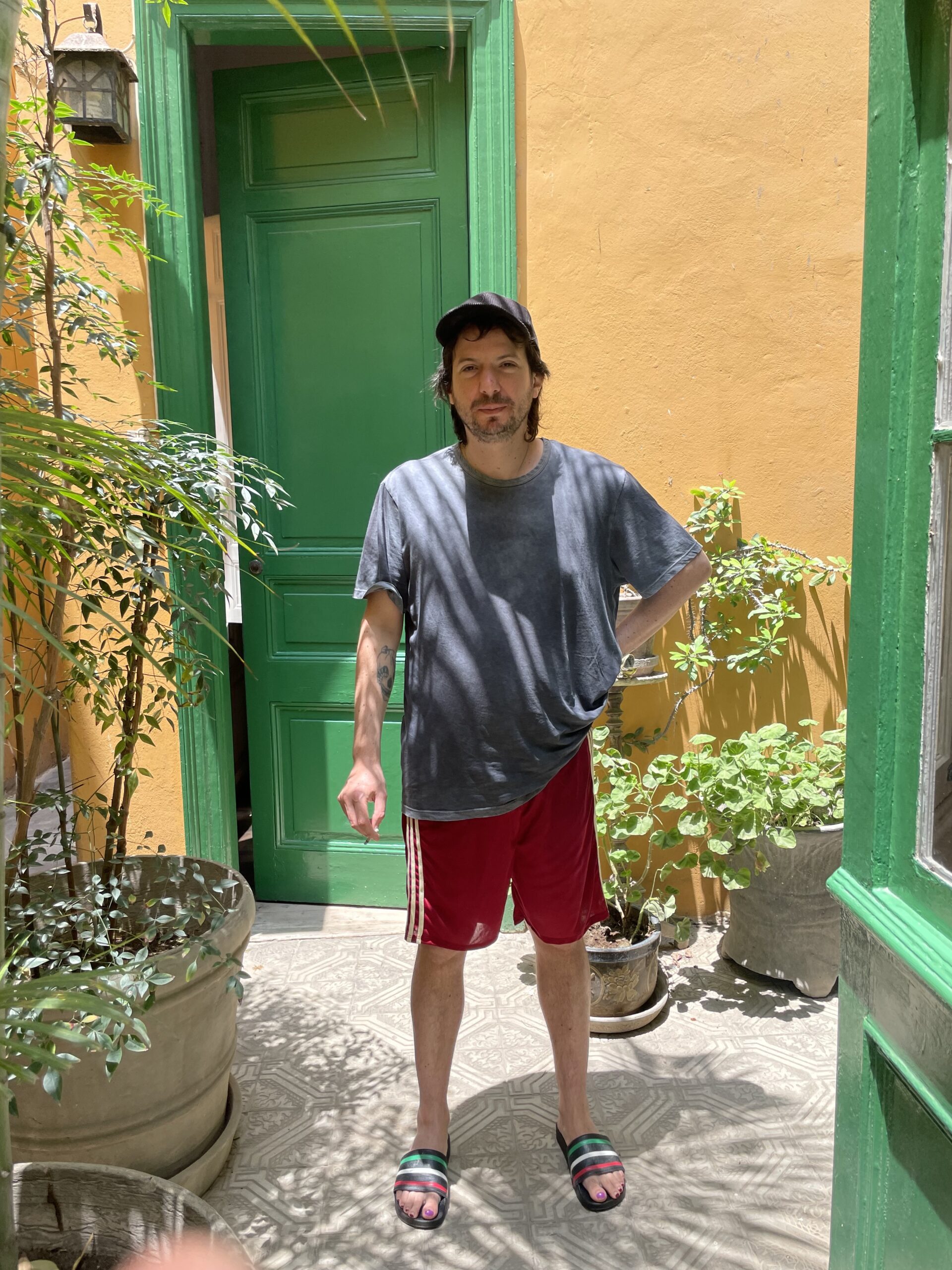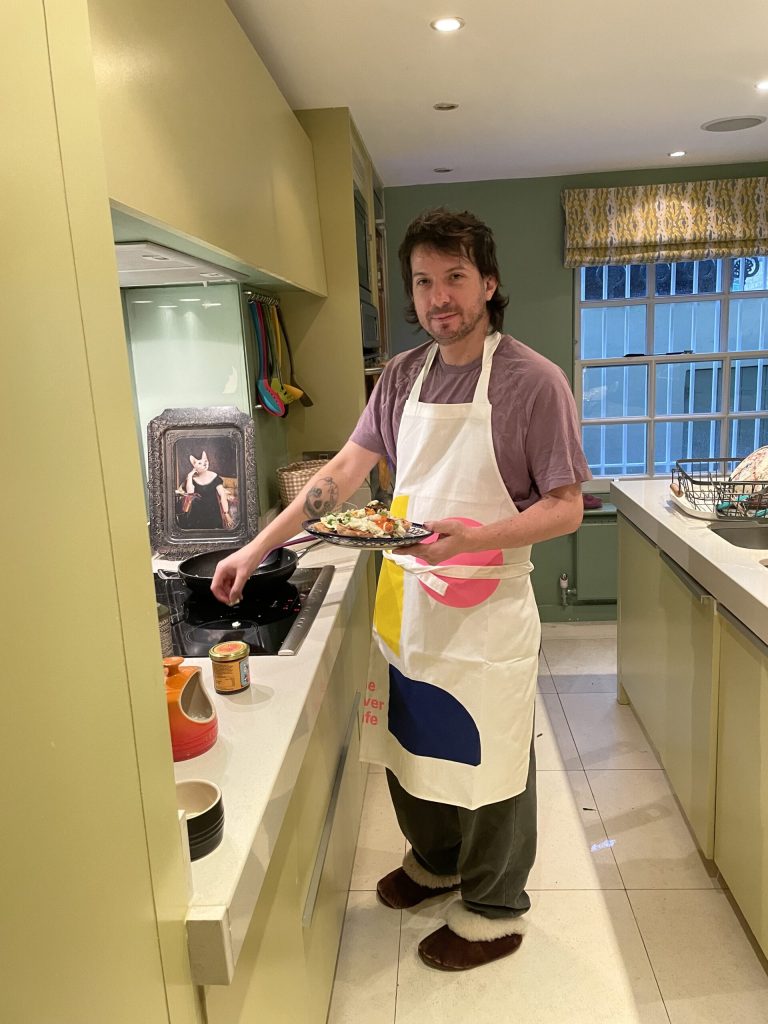 The first time I met Luis Felber was in London in September of 2021, the night before he married my BFF and eternal stage mother, Lena Dunham. I’m an enthusiastic supporter of impulsive decisions, and was not particularly concerned by the fact that I’d only heard stories and anecdotes about this person who would suddenly enter my life. I thought it sounded fun, but was also relieved when I finally met him to immediately understand that it was also rational and logical and maybe perfect. Now Lu is having his own moment, having both co-created and scored the new Netflix show, Too Much, as well as releasing the new Atalwalpa album, Experience. We sat down and talked about what it’s like to see your music coming out of someone else’s body, how easy it is to confuse fiction and nonfiction, and the golden era of 2000s bad behavior.
The first time I met Luis Felber was in London in September of 2021, the night before he married my BFF and eternal stage mother, Lena Dunham. I’m an enthusiastic supporter of impulsive decisions, and was not particularly concerned by the fact that I’d only heard stories and anecdotes about this person who would suddenly enter my life. I thought it sounded fun, but was also relieved when I finally met him to immediately understand that it was also rational and logical and maybe perfect. Now Lu is having his own moment, having both co-created and scored the new Netflix show, Too Much, as well as releasing the new Atalwalpa album, Experience. We sat down and talked about what it’s like to see your music coming out of someone else’s body, how easy it is to confuse fiction and nonfiction, and the golden era of 2000s bad behavior.
———
ALISSA BENNETT: Hi Lu! I have to tell you that this is my great pleasure. Thanks for coming over and talking.
LUIS FELBER: It’s my great dream to be interviewed by you.
BENNETT: Are you doing a lot of interviews lately?
FELBER: More than usual.
BENNETT: Do you feel comfortable with that? Is it weird to have to talk about yourself all the time now?
FELBER: It depends whether I feel comfortable in myself that day; it takes me a moment to empty out the closets of my mind until I’m feeling flowy, and then I’m fine.
BENNETT: Do you exercise? I’m trying to believe in exercise.
FELBER: Yes. I stretch every morning. It just helps me be in my day.
BENNETT: Do you meditate?
FELBER: I feel like I’m too edgy to meditate.
BENNETT: I recently confessed in writing—and now I’m just confessing it verbally—that every time I try to meditate, the only thing I see is a raccoon running around in circles on a porch.
FELBER: What’s the raccoon doing with his hands?
BENNETT: He’s just manically running around in circles with flashing eyes.
FELBER: Wow.
BENNETT: Once, me and Lee were driving down a country road, and we saw a raccoon stumbling beside us—not frothing at the mouth, but definitely rabid—and I threw an apple at him, and then we drove away.
FELBER: I hope he’s okay.
BENNETT: He’s fine! So you’ve been doing a lot of interviews because you have a lot of things going on.
FELBER: Just had an album come out.
BENNETT: That’s a big deal.
FELBER: Also we just did this TV show, which is new for me.
BENNETT: How is making a TV show different from making an album?
FELBER: Well, when you make an album, and the payoff, I think, is that you get to perform that album that you’ve spent one to five years making. With a TV show, the work’s done, so when you’re promoting, you’re just talking about it and answering the same questions, having the same passive-aggressive arguments that your press person already warned you about.
BENNETT: When you do interviews for something like a television program that you’ve created, does your PR person prepare you for negative questions?
FELBER: You never know exactly what’s going to come up, but they did tell us that people were going to constantly ask if Will Sharpe and Meg Stalter are us. “Are these two people you guys? Is this a biopic?”
BENNETT: Duh.
FELBER: And the answer is “No, it’s a TV show, duh.”
BENNETT: Tell me about your album, which came out just after Too Much.
FELBER: It’s called Experience, and while I was writing it, I had a dream that I was carrying these plastic bags filled with all my things. I didn’t want to lose these bags, and I went on this journey. I was very nervous about dropping them, and then suddenly I didn’t have the bags; I was on a sand dune, which turned into a bunk bed, which was my old bunk bed when I was a kid, and at the end of the bunk, there was a piece of paper saying “experience.” I woke up and I realized that it’s not about where you end up, it’s about the journey to the experience. I was like, “Oh, that’s a good name for an album.”
BENNETT: Have you had this dream analyzed by a Jungian?
FELBER: No, but you can go ahead.
BENNETT: We need a professional, but I’d like to get a complete assessment of the raccoon that’s running around inside your brain. Tell me more about writing an album.
FELBER: There have been times where I’ve written an album, but I’ve been lacking in confidence to be like, “There are 15 songs, I’m going to narrow it down to 10.” I always just have the impulse to make an EP, or maybe release five singles, or maybe it’s two EPs. But once I had that dream, I realized I needed to make this record, so that’s what we did. A lot of the songs ended up featuring in Too Much, but at the time of making the TV show, the songs were just demos or thoughts in my head or on my hard drive; they weren’t finished things. We demoed them through this character that Will Sharpe plays in the show, and by the end of making that, I knew what I wanted the songs to sound like on my record.
BENNETT: When Will Sharpe is performing your songs, even though Will Sharpe is not you because it’s a television show—
FELBER: Yeah, it’s Felix. Let’s keep reminding ourselves that.
BENNETT: Is he singing?
FELBER: He’s singing.
BENNETT: And playing the guitar?
FELBER: Yeah. He wanted to do that.
BENNETT: He’s very good.
FELBER: He’s really good.
BENNETT: Did it ever make you mad?
FELBER: Yeah, I went through all the emotions.
BENNETT: It’s cool to admit that.
FELBER: Yeah.
BENNETT: You felt a little jealous?
FELBER: Jealous? The guy has a great hairline.
BENNETT: He’s got a lot of great stuff going.
FELBER: He’s got stunning pecs. He’s a lovely man as well. He’s a great dad, he’s a fantastic husband, very talented actor, very talented director. I was really obsessed with this show Flowers when it came out. Everyone should see that show. It’s a real insight into the dread of English country life, and he gives it a very cool angle. But yeah, the first time we met was at a dinner with both of our wives. The second time we met was in an office talking about this TV show. The third time we met, I started playing him these songs and he brought his guitar, and I wrote all the lyrics out and the chords. I didn’t know how much music he knew, but he said to me, “I want to be able to play these songs inside out.”
BENNETT: And then he did it! That is acting, sir!
FELBER: And I thought, “He’s not going to play them like me,” because I’ve been playing guitar for over 20 years, and I can literally play most of these things behind my head. I knew that it would be Will Sharpe’s character, Felix, playing these songs—that he was going to make his version. I didn’t know what to expect, so I had to have faith.

BENNETT: It’s interesting to think about your music coming out of someone else’s body. As you said, people are going to want to interpret this show as though it’s about you and Lena, and there’s no way to negotiate that. But it’s interesting to think about all of this ventriloquism that’s going on.
FELBER: Meat puppetry. Yeah. But it starts like that before you write the script, and then when you start writing a script, it becomes its own thing. So the initial seed was our love, the idea of Americans and English people not speaking the same language, but then it just became its own thing. But the thing that will always make me identify with Felix is these songs, because they’re real to me.
BENNETT: And you said this is your second album?
FELBER: Yes.
BENNETT: But you’ve been playing music for a really long time.
FELBER: A really long time, now I put it out as Attawalpa, which is my middle name.
BENNETT: What does it mean?
FELBER: It’s the name of the last Inca king before the Spanish invaded Peru in 1500, so he’s the coolest Inca king if you think about it.
BENNETT: The last!
FELBER: Yeah. The last one that was before Western rule. He tried to run away, he tried to give the Spanish a bunch of gold thinking that would make them go away, because gold was the thing up there, it turned everyone on and made everything go. But they just sent it to Spain, melted it down, and obviously still conquered. So he ran away and apparently it goes that they found him in a drinking tavern.
BENNETT: A bar?
FELBER: I wanted to say a bar in the Amazon, and they hung him on the spot.
BENNETT: Well, fuck! So you start making music under this name.
FELBER: Yeah, it took me a while to find that name, but I landed on it because my sobriety coincides with Attawalpa’s birthday.
BENNETT: But you were also making music before that.
FELBER: Oh yeah, just not for myself. I was writing for other people, being in bands of other people, playing guitar for other people. But Attawalpa started as me taking some songs with my friend Matt Alchin. We made two EPs, and then we made a record called Presence, and this is the second record, Experience. But yeah, I have been making music since I was 17.
BENNETT: I want to go back to when you were 17 for a minute because I like an origin story.
FELBER: Who doesn’t?
BENNETT: So you’re 17 years old.
FELBER: Living in Hampshire.
BENNETT: Where’s Hampshire?
FELBER: It’s like Connecticut.
BENNETT: Are you doing bad behavior there?
FELBER: Well, yes. I’m at boarding school and it’s the first time I’ve been around girls.
BENNETT: Okay, so you’re 17, you’re in Connecticut.
FELBER: No, I’m in Hampshire. This little town called Petersfield, which is an hour and a half out of London. I moved houses about seven or eight times before I was 12, so this is where I ended up. I was very shy before I went to that school and it helped me open up and embrace the fact that I love music and I love films, and I learned the guitar. All I wanted to do was write songs, and my brother basically convinced my dad that I should go to music college for a year and leave school, so I never finished school. Went to music college for a year in Guilford, but didn’t finish that either. But I started a band called The Eraserheads after David Lynch’s funny, scary nightmare dream, and I moved to London with The Eraserheads.
BENNETT: Around what year?
FELBER: 2005 or 2006.
BENNETT: 2006 is a crazy time there, no?
FELBER: Yeah. I moved to London to pursue this band for a year and if that didn’t work out, I didn’t really know what the B plan was. My dad gave me a year to try to make it work.
BENNETT: And you’re 19, so you’re like, a year seems like forever.
FELBER: I wasn’t 19. I think I was like 17 or 18. I moved there with my band, ended up doing these club nights called Young Turks. They went very well, and the reason I got into club nights was because the promoters in London were very difficult—it was very pay-to-play mentality. So I just decided that I should put on my own parties, and I could play my parties. And these nights, Young Turks, turned into a record label that’s now called Young, with FKA Twigs and the xx, and they’re a subsidiary of XL Recordings. I started that with my friend Caius. But at the time they were just club nights, and I became a bit of a party guy; I don’t remember my twenties much because I was drunk and on drugs.
BENNETT: What was your drink?
FELBER: For a long time it was a shot of Jameson and a bottle of Heineken.
BENNETT: And what was your drug?
FELBER: Anything.
BENNETT: Anything.
FELBER: Yeah.
BENNETT: We call that a ”trash-can junkie.”
FELBER: Yeah, but I remember the first time I was in New York, I tried OxyContin. I snorted a lot of Oxy thinking it was cocaine and nearly died.
BENNETT: America!
FELBER: Yeah. It was definitely an experience. That same trip, or maybe it was another trip, I did DMT, and it was a similar out-of-body thing.
BENNETT: Did you see trolls?
FELBER: No, I felt like…
BENNETT: Everyone’s always like, “I’ve got to go smoke this DMT so I can see some trolls.”
FELBER: No, I saw god. But it was within me and the world. I felt connected to everything and I was outside of my body. Then we were outside of this apartment in Tompkins Square Park that used to be an old Jewish school. And then I was outside of New York, and I was outside of our planet, and I could just see myself being connected to everything. I remember it like it was yesterday, and I was 24 when I did it.
BENNETT: So you remember that, but most of the decade is lost?
FELBER: I have a very specific memory for random things. But I was in a lot of bands, made a lot of music. My only regret is that I didn’t put out half of that music, because when you’re smoking weed every day, you think it’s giving you an energy of release or creativity, but really, it’s very hard to make decisions.
BENNETT: It’s also being young. You don’t trust that you can make good work when you’re young, and it’s what I think is really special about Girls, is that as young as Lena was, she trusted that she was making something that would be important. I don’t think most people feel that in their twenties.
FELBER: No. But if you have something that’s great, you want to hold on to it and wait for the right moment to put it out. But actually, the moment is now.
BENNETT: That’s good advice.
FELBER: There’s never a good moment to do anything but right now. But looking back, I have put a few of those songs out which I didn’t put out back then. But that’s the only thing, really, that I wish I’d done. And then when I stopped everything in 2018, I started taking these songs seriously and put myself out there more.
BENNETT: London between 2005 and 2015 was a really quite a scene.
FELBER: Yeah.
BENNETT: Lots of personalities. Lots of bad behavior.
FELBER: At the time we were trying to be very cool about it, I think. I can only speak for myself and maybe a group of friends. We didn’t sit there and be like, “Wow, this is amazing, we’re in the middle of this whole thing that’s happening.”
BENNETT: Well, you don’t feel it when you’re in the moment.
FELBER: No, but it was definitely that. We used to go to this club night called Frog, which is very similar to your Misshapes, and the guys that ran that night lived above a pub which we used to frequent in North London all the time. A lot of people came out of that scene, and they’re still doing music now and writing songs for pop stars, or are pop stars. And a lot of people didn’t make it, as most scenes go. But it was a really exciting time.
BENNETT: Do you have any Amy Winehouse stories?
FELBER: Yeah. I used to live in Camden, and she would frequent the pub next door to us called The Good Mixer, and I’d see her a couple of times, and then another time at the Hawley Arms. One of my bands was playing, and we were really loud and obnoxious. We were a fresh punk band, but she was just there having a good time.
BENNETT: She loved to have fun!
FELBER: Too much fun.
BENNETT: What do you think lets a person know when they’re having too much fun?
FELBER: If they’re dramatically losing weight.
BENNETT: Yes.
FELBER: I don’t think I ever really drank water in my 20s.
BENNETT: Really?
FELBER: Yeah. And now I drink it every day.
BENNETT: What do you have in London that you wish that we had here?
FELBER: No guns.
BENNETT: Oh, okay.
FELBER: I can’t really feel comfortable around so many guns, Alissa.
BENNETT: We don’t have any guns here. Not in this home.
FELBER: Yeah. It’s that mentality for me.
BENNETT: You still can. Anyway, Experience is out! Did you cry when you made it out of frustration?

FELBER: I cried when we completed this song called “You Are You,” and my friend, actually, a New York friend, called Esme, made a music video for it. She’s an animator. And I cried when I saw that.
BENNETT: That’s nice.
FELBER: Yeah, because I think the completion of something, I used to find it very hard to finish things. And then I’d find it even harder to finish them and put them out in the world.
BENNETT: Relatable. So what happens next? You play the songs from the album live?
FELBER: I guess we play them live for about a year or six months.
BENNETT: Until you’re sick of them.
FELBER: Until I release the next album. I never get sick of the songs, but I’ve already got enough songs to start working on a third record.
BENNETT: Busy busy!.
FELBER: We’ll have something else. So always, yeah, I got to keep busy. Got to keep these raccoon thumbs busy.

